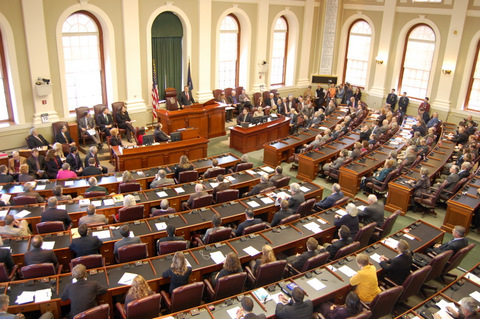A pair of school choice initiatives backed by Maine’s governor has received a cold legislative reception, including the demise of a proposal to open the state’s publicly funded tuition program to religious schools.
Two of four education bills supported this year by Gov. Paul LePage (R) would expand Maine parents’ power to select different education options for their children. Neither has been able to secure a majority of votes, but the state’s unusual legislative procedure keeps one of the choice measures in play for now.
“The governor’s initiatives are good,” said Kenneth Capron, CEO of the Maine Policy Institute. “It’s all about getting money to follow the child.”
Rewritten in Committee
Legislators have not responded favorably, however. The House Education Committee overhauled Legislative Document 1854, which originally was written to allow students to take state education dollars to nonresidential public school districts or approved private schools.
Twelve of 13 committee members voted instead to convene a task force to draft school choice proposals legislators could consider in 2013. The committee’s other member backed a version of open enrollment that excluded private schools. Under Maine legislative rules, the full House could have adopt the majority report, minority report, or another option altogether. It chose to adopt the majority report recommending taxpayer dollars not be allowed to fund private schools..
“We are certainly encouraged by the fact that all members of the committee see the need to do some sort of school choice legislation,” said Maine Department of Education spokesperson David Connerty-Marin.
Religious Choice Rejected
The defeat of the governor’s other school choice measure has been sealed. LD 1866, a companion to LD 1854 which would have restored religious schools’ eligibility to participate in Maine’s town tuitioning program, was voted down heavily in both chambers.
Since 1873, Maine’s tuitioning program has granted rural towns the ability to direct local and state education tax dollars to private schools. According to the Friedman Foundation for Educational Choice, private schools in the program served more than 5,000 students in 2010. In 1981, the Maine legislature excluded religious schools from participating, a provision twice challenged unsuccessfully in state courts.
“The legislature should address the court’s decision,” Capron said. But he also said the choice initiatives suffered from insufficient outreach. “There has been little or no effort to educate the public about these issues.”
Local Pushback
Private schools could bypass the town tuitioning program altogether to receive public funding, under the original version of LD 1854, enabling parents to bypass their community’s decision and take funds directly to an approved “open enrollment” private school. But the desire to keep local taxes within school district coffers has fueled some opposition.
“I don’t think that any state capitol should tell local taxpayers what to do with locally generated taxpayer dollars,” said James Morse, superintendent of Portland Public Schools.
Portland’s 7,000 students make its school system the largest in Maine. Eighty percent of the property-rich district’s revenues come from local tax sources, more than five times the amount of state dollars it receives.
Under current law, a student may transfer to a school district outside their area of residence if the superintendents of both the outgoing and receiving districts sign off on the enrollment change. Morse says he approves requests “99 percent of the time,” but he acknowledges it can be “pretty common” for superintendents to deny a transfer in less populated parts of the state.
Taking Stock
Despite his concerns about the school choice initiatives, Morse favors much of the governor’s education agenda and lauds the state’s appointed schools chief Stephen Bowen.
“The commissioner is doing a good job articulating the issues that affect Maine’s children,” he said.
LePage introduced two other education initiatives to the legislature in 2012. Proposals to increase access to vocational education alternatives and to tie teacher evaluations more closely to student achievement moved forward with less controversy.
Despite the cold reception to more significant school choice proposals state officials are not ready to concede defeat on both initiatives.
“We’ll have to take stock and decide what to do next,” Connerty-Martin said.




